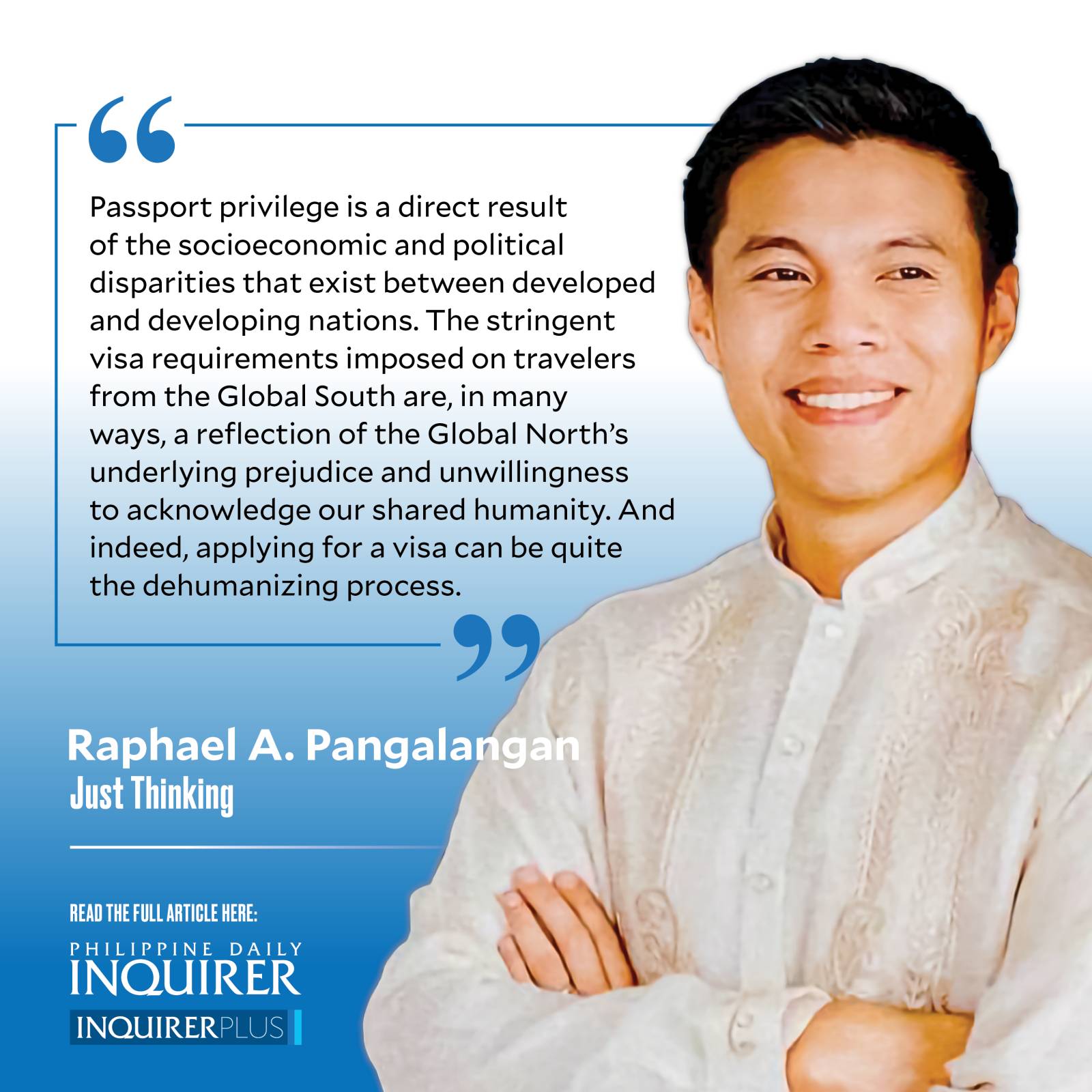The problem that is passport privilege

Do not be fooled by its burgundy leather embossed with gold. Beneath it’s glossy sheen, the Philippines passport finds itself at the bottom half of the global power ranking. Out of 102, we placed 75th.
I know all too well the stories of money spent and time wasted queued at the local visa facilitations services. Far from something simply par for the course, the visa application process is nothing short of neocolonial oppression. Alas, today’s highly globalized world discriminates between the color of skin and passports alike. Indeed, this little booklet tells a complex story. Of an unseen wall that separates the Global North from the Global South built upon a foundation of conquest, exploitation, and the instability they caused.
Passport privilege is a direct result of the socioeconomic and political disparities that exist between developed and developing nations. The stringent visa requirements imposed on travelers from the Global South are, in many ways, a reflection of the Global North’s underlying prejudice and unwillingness to acknowledge our shared humanity. And indeed, applying for a visa can be quite the dehumanizing process. And to imagine: Of the 195 countries in the world, Filipinos have to undergo that grueling procedure for 121 of them. The world is not our oyster. In terms of country representation, 62 percent of the shell is presumed shut.
Friends and colleagues from more passport privileged nations are puzzled when they learn about the pains we Filipinos go through just to be able to travel abroad. Much more than your humdrum red tape, we are asked to provide an interminable list of documents evidencing financial capacity, among other requirements. (The Schengen Visa process is particularly demanding, and requires confirmed flight reservations for the trip with no promise of the visa being approved. It’s simply a risk we as Global South applicants need to bear.)
Yet visa applications also inevitably involve a time investment, which would require the aspiring traveler to go on leave from work. The visa system thus simultaneously asks us to have money and lose money at the same time. Yet as we are made to jump through hoops and literally prove our worth, western “begpackers”—a portmanteau of the words “beg” and “backpacking”—are able to travel to developing countries on a whim and rely on begging, street performances, or selling trinkets to fund their “spiritual adventure.”
They say it’s quite easy to become a begpacker. All you need is a pair of yoga pants, an instrument you can barely play, and an outstanding sense of entitlement. Having lived like kings never having heard of budgets, they blow their funds on cheap thrills and take to the streets to ask the locals to fund their gap year. While this may seem harmless at first glance, “begpacking” exposes the double standards of passport privilege and reveals the inherent inequalities in our global society.
It’s been often pointed out how begpacking may violate visa work restrictions, local laws, or circumvent tax requirements. True enough, if the shoe were on the other foot, begpacking would be simply called “vagrancy” where summary deportation and blacklisting proceedings would soon follow. But while all true and problematic in their own ways, the deeper ethical issue at play is the audacity of the well-off foreigner to beg alongside the homeless and poverty-stricken locals.
Unlike the truly needy, begpackers aren’t living off handouts to survive. Rather, they are asking us to crowdfund their “eat, pray, love” adventure that will be glamorized till kingdom come to fuel their self-conception of worldliness—all the while exploiting the kindness of our communitarian societies, and undermining local economies. And on the other hand, the global southerner finds a strange spectacle in begpacking. When the white privileged ask for help, the tables have turned, the universe is turned upside down, and the beneficiary becomes the benefactor. Slave becomes Samaritan.
The visa system, in light of begpacking, becomes particularly troubling. It highlights the double standards of passport privilege and the inherent inequalities in our global society. Passport privilege has real life consequences for those on the losing end of this hierarchy. Opportunities for education, work, and personal growth are limited by the constraints of one’s passport. The cumbersome and costly visa application process, coupled with the ever-present risk of rejection, serves as a barrier to social and economic mobility for countless individuals.
While the Philippines’ gross domestic product relies heavily on tourism, it is essential to consider alternative arrangements that promote parity and reciprocity. This is not just about national pride, but about ensuring fairness and establishing seas and skies as equally two-way routes. As we witness begpackers reveling in their globe-trotting adventures, we must also remember the unseen wall that stands between the Global North and South, a barrier to dreams, aspirations, and opportunities. Let us dismantle this barrier and in its place build a more equitable, interconnected world where the color of one’s passport does not dictate the trajectory of life’s path.
——————-
thinkjustly@gmail.com




















